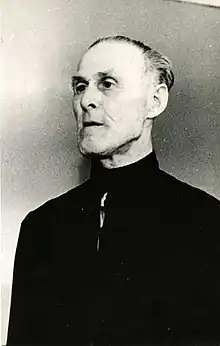Sultan Klych-Girey | |
|---|---|
 Klych-Girey at the Military Collegium of the Supreme Court of the Soviet Union, 1947 | |
| Native name | Султан Клыщ Кӏэрый |
| Born | 15 March 1880 Maykop or Ulyap, Russian Empire |
| Died | 17 January 1947 (aged 66) Lefortovo Prison, Moscow, Russian SFSR, Soviet Union |
| Cause of death | Execution by hanging |
| Allegiance | |
| Years of service | 1897–1920 1941–1945 |
| Rank | Major general |
| Unit |
|
| Commands held | North Caucasian and Mountain-Caucasian legions |
| Battles/wars | |
| Relations | Giray dynasty |
Sultan Shakhanovich Klych-Girey (Russian: Султа́н Шаха́нович Клыч-Гире́й; Adyghe: Султан Клыщ Кӏэрый, romanized: Sultan Klˢʼəś K'ɛrəj; 15 March 1880 – 17 January 1947) was a Russian and Circassian general of Crimean Tatar descent. A career military officer, Klych-Girey participated in the suppression of Russian Revolution of 1905, fought in World War I and the Russian Civil War for the Russian Empire and White movement before becoming a supporter of Circassian nationalism as a White émigré. During World War II, he collaborated with Nazi Germany and served in Cossack collaborationist units, for which he was repatriated to the Soviet Union and executed by hanging in 1947.
Early life and career
Sultan Shakhanovich Klych-Girey was born in the city of Maykop or the aul of Ulyap, in what is presently the Russian republic of Adygea.[1] He was a descendant of the Giray dynasty, and through the Giray dynasty a Genghisid via Jochi.[2] After receiving an education at the Lutheran Gymnasium in Saint Petersburg, he joined the Imperial Russian Army in 1897 and joined the Yelisavetgrad Cavalry Cadet School, from which he graduated in 1901.[3]
Klych-Girey participated in the government crackdown on the Russian Revolution of 1905,[1] and was serving in the Caucasian Native Cavalry Division when World War I began. During the Russian occupation of Zalishchyky, he suffered from shell shock, but he was not dismissed from service. In 1916 he was promoted to colonel.[3]
Russian Civil War
Following the signing of the Treaty of Brest-Litovsk and Russia's withdrawal from World War I, Klych-Girey returned to the Caucasus. There, he participated in the defence of the Maykopsky otdel against the Red Army by North Caucasians before joining the White movement.[3] On 25 March 1918, he was promoted to major general and commanded the Circassian Cavalry Regiment[1] (though true power allegedly rested with Sultan Adil-Girey, a colonel serving in the unit).[4]
After the evacuation of the Crimea, Klych-Girey was instructed by Pyotr Wrangel to travel to Karachay and organise "white-green" resistance to Soviet rule. Klych-Girey proceeded to organise a resistance movement in the region, but was soon defeated by the Red Army and forced to flee to the Democratic Republic of Georgia.[1]
Exile and World War II
After the Red Army invasion of Georgia, Klych-Girey fled the Caucasus to live abroad. In exile, Klych-Girey became a supporter of Pan-Caucasianism, and was active in the movement among White émigrés. He was a leader of both the People's Party of Highlanders of the North Caucasus, which supported an independent pan-Caucasian state in the North Caucasus, and the Caucasian National Committee, which also included Georgia, Armenia, and Azerbaijan in its proposals for a pan-Caucasian nation.[1]
When Operation Barbarossa began in 1941, Klych-Girey began working with the government of Nazi Germany to organise North Caucasian prisoners of war into military units within the Wehrmacht. He began by participating in anti-partisan reprisals in occupied Yugoslavia before shifting his focus to the North Caucasus after German troops entered the region in 1942. Klych-Girey spoke to Circassian audiences living under occupation, calling on them to support what he called a "war of liberation". Klych-Girey's North Caucasian and Mountain-Caucasian legions were subordinated to the Kosakenlager of Don Cossack ataman Pyotr Krasnov.[2] According to a report from Soviet MGB director Viktor Abakumov to Joseph Stalin in 1947, he also participated in the crackdown on partisans and Communist Party of the Soviet Union members in areas under German control.[5]
In 1943, with the defeat of German forces in the North Caucasus, Klych-Girey's forces were transferred to Italy. He would continue to fight there, and then in Austria, until his capture at the end of the war.[3]
Repatriation, trial, and execution
In May 1945, Klych-Girey was captured by British forces at Oberdrauburg. On 29 May 1945, along with 125 other collaborationist military personnel from the Caucasus, he was transported to Judenburg and handed over to the NKVD.[1] In the Soviet Union, Klych-Girey was placed on trial, alongside other military personnel who had worked alongside Krasnov. During the trial, he was found guilty of treason, counter-revolutionary activities, and terrorism, and executed on 17 January 1947.[2]
References
- 1 2 3 4 5 6 "КЕЛЕЧ-ГИРЕЙ Султан. (1880–1947)" [KELECH-GIREY, Sultan. (1880–1947)]. Russian Military Emigrants 1920–1940. History, Publication, Research (in Russian). Retrieved 24 September 2023.
- 1 2 3 Egorov, Boris (14 December 2022). "Why was a descendant of Genghis Khan executed in the USSR?". Russia Beyond. Retrieved 24 September 2023.
- 1 2 3 4 "Султан-Келеч-Шаханович-Гирей" [Sultan-Kelech-Shakhanovich-Girey]. The Russian Army in the First World War (in Russian). Retrieved 24 September 2023.
- ↑ Musukayev, A. I. "«ГЕНЕАЛОГИЯ СЕВЕРНОГО КАВКАЗА»: Историко-генеалогический научно-реферативный независимый журнал" ["NORTH CAUCASIAN GENEALOGY": Historical and genealogical independent scientific-reference journal] (PDF). cerkesarastirmalari.org (in Russian). Archived from the original (PDF) on 7 April 2014. Retrieved 24 September 2023.
- ↑ "1947 Memorandum, USSR Council of Ministers to Cde. Stalin, I.V." Woodrow Wilson International Center for Scholars. 21 October 1995. Retrieved 24 September 2023.